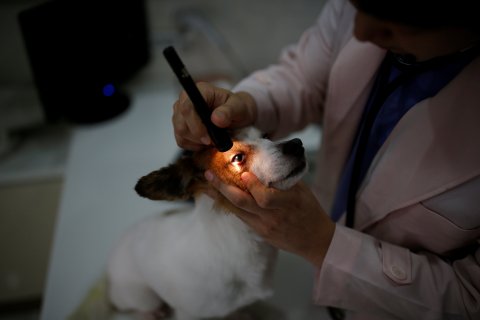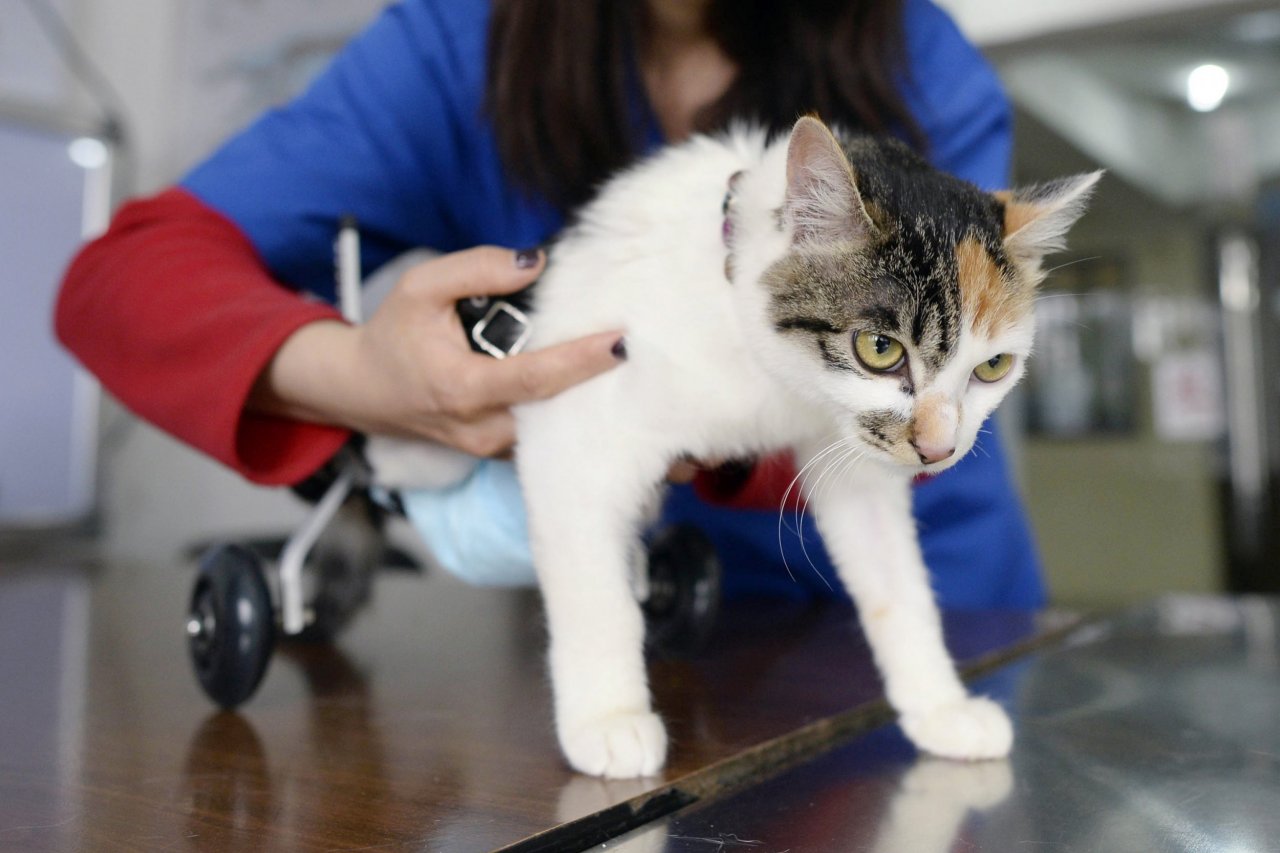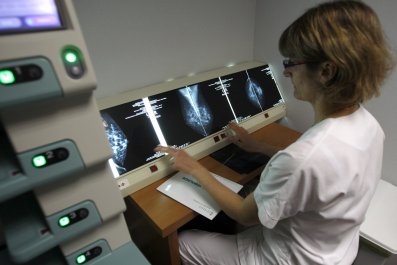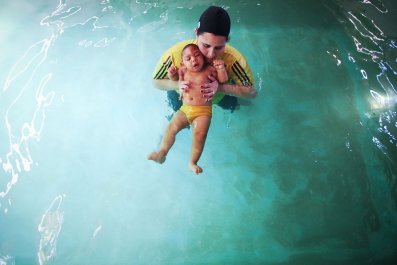When Sabrina finally got home from the hospital, it was pushing 10:30 pm. She was ending another 100-hour work week, and she was exhausted. But just as she was putting her bags down, the phone rang. It was work. She'd been called back in.
For Sabrina, a recently graduated veterinarian, that night ended as so many others had that year: with her on the hospital floor, sleeping three or four hours (the sole cot was reserved for more senior staff). She would awake to begin another 14-hour shift, enduring verbal abuse and disrespect. "Uppity clients curse at me weekly because they don't like what I have to say about their animal or they don't want to pay," she says. "I've been threatened to be sued multiple times, and I've had a man almost hit me." Co-workers are not much better. Technicians regularly undermine her, while senior doctors treat her as their secretary, forcing her to do their paperwork rather than providing mentorship. "It's frustrating because we're doctors, but we don't get respected as such at all," she says. "I hate it here."
Sabrina is one of more than 2,000 newly graduated veterinarians who apply annually for an internship—a year-long stint at a university or private practice meant to hone a young vet's skills. Internships are not mandatory, but an increasing number of graduating veterinarians are choosing to pursue them—36 percent in 2014. For many, the programs pave the way to specialty residencies in fields like cardiology, dermatology and exotic animal medicine. Others opt in because they believe the experience will give them an edge over those who go straight into practice.
But internships are notorious for brutal hours and extremely low pay—just $30,000 on average—and unlike in human medicine, no independent authority oversees veterinary internships to assure their quality and provide assistance, should a problem occur. As a result, many senior veterinarians and technicians consider internships to be a kind of hazing—a right-of-passage in which hardship for hardship's sake is institutionalized. Though no data exist on interns' mental health, depression and anxiety seem commonplace.
Many young veterinarians want the system to change but are terrified of speaking out; most interviewed for this story, including Sabrina, requested anonymity for fear of being blackballed professionally. "People in the vet world are not willing to talk about this reasonably, or to negotiate," says a veterinarian based in Kentucky. "If you bring something up about this you'll be shunned and labeled a complainer—and they don't like complainers."
Sabrina agrees. "Our community is so small. If I speak out and later want to get a job, I'll have a hard time, because everyone knows everyone else."
No regulations
"Slave laborers"—that was the term used by several of the 13 current or former interns Newsweek interviewed. "No one is looking out for these kids, and no one vets these internships," says Bradford Smith, a professor emeritus at the School of Veterinary Medicine at the University of California, Davis. In 2006, he published a paper detailing how to select an internship, with the hope of helping students avoid getting taken advantage of.
Those who follow his advice may wind up in a quality program where they receive top-notch mentorship and training. Zack Wells, a veterinarian who recently completed an internship at Carolina Veterinary Specialists in North Carolina, for example, says his program was great. But even Wells worked 70- to 80-hour weeks and frequently went three weeks without a day off. And the five days of vacation he was promised turned out to be nearly impossible to take.
Wells, however, counts himself as lucky. There are internships with all of the drawbacks but none of the professional development perks. "Some places use interns as people who will cover their overnights and to whom they don't have to pay a real salary," says Mac, a private practice veterinarian. "It's genius if you own your own clinic, but for the interns, it's the equivalent of sweatshop labor."
When Anne, a private practice veterinarian, interviewed for her internship in Florida, for example, the program struck her as supportive and welcoming. But during orientation, an outgoing intern revealed its actuality: "Make no mistake about it," he told Anne. "Your primary role here is to make the hospital money, and if you happen to learn something along the way, well that's great." True to the warning, Anne received little mentorship and every quarter the bosses would sit down with each intern to discuss ways to increase the amount of money he or she was earning the hospital.
The situation is very different for medical doctors. Their residencies are strictly overseen by an independent body called the Accreditation Council for Graduate Medical Education (ACGME), which ensures standardized on-the-job education and looks out for residents' quality of life. The council limits residents' time on the clock to 80 hours per week, averaged over four weeks, and caps the number of hours and days they may work in a row.
Research supports the benefit of such protocols. One study showed that limiting residents' shifts to no more than 16 hours of consecutive work reduced the number of medical errors they made, while another reported that residents' attention failures declined by more than half when they worked less than 80 hours per week.
No such time caps exist for veterinary interns, however—a fact that employers regularly exploit. Michael, who undertook an internship at one of the top veterinary schools in the country, describes the work as thankless and rough. On top of scheduled 5:30 am to 8 pm shifts, he and one other intern handled all overnight emergency calls throughout the year. He often went two to three days in a row without sleeping more than a few hours. "What concerned me the most was my mental state," he says. "I was non-functional on many days."
Money woes also add stress. In 2015, while interns were earning $30,000, graduates who took jobs as general veterinary practitioners made $70,000. "We calculated how much we were making per hour, and it was about $2 to $3," says private practice veterinarian Greg Schmid of his New Jersey-based internship. "I feel like there were some labor laws we were violating." In fact, there were not. According to the Department of Labor, veterinary interns and residents fall under the learned professional exemption, meaning they do not qualify for overtime or minimum wage protections unless they make less than $23,660 annually. (That figure was supposed to rise to $47,476 on December 1, but a federal court issued an injunction preventing the department from implementing the new rule, which is now in litigation.)
Despite earning less than half as much as their counterparts who began practicing immediately, former interns enjoy no advantages in salary once they hit the job market. One analysis even found a significant association between internships and subsequent unemployment. This is especially problematic considering that the average veterinarian graduates with $142,000 in debt. As Michael Dicks, director of the Veterinary Economics Division of the American Veterinary Medical Association, puts it, "We have not been able to measure any tangible benefits associated with doing an internship."

Breaking Points
The year can take a serious physical and mental toll on interns, who often gain or lose weight as sleeping and eating patterns are disrupted and regular exercise becomes impossible. Depression is also commonplace. Sabrina lost 15 pounds and found herself in a constant state of sadness. Senior veterinarians assured her that this was normal: they all took antidepressants during their internship year, they said, and so should she. Not wanting to form a dependency, she met with a therapist instead. But her schedule prevented her from keeping up with appointments, so she discontinued the care. "I didn't even consider taking off work for that," she says.
Research indicates that both veterinary students and practitioners are at an elevated risk of certain mental health issues. Between 32 and 69 percent of students suffer from symptoms of depression high enough to benefit from treatment—figures that are significantly greater than those seen in comparable studies of both medical students and the general population. A 2015 study of more than 11,000 practicing veterinarians found that 31 percent reported depression since leaving school and 17 percent had thought about suicide.
No one has specifically studied veterinary interns' wellbeing, but the 2015 study did find that those who had been working for less than five years—a category that includes interns and residents (those who have gone on to further specialize)—reported higher rates of distress. From that group, 13 percent had considered suicide since graduating. "That's striking because we're only talking within the last three to four years," says lead author Randall Nett, a medical epidemiologist at the Centers for Disease Control and Prevention. Nett also found that, compared to the general population, a higher proportion of veterinarians perceive a stigma toward mental illness. "That is a risk factor for suicide, and a barrier to seeking effective treatment," he says.
Regardless of how bad things get at an internship, quitting usually does not enter into the equation. For one, internships are a required stepping stone for residencies—although completing one does not guarantee a spot in one of those coveted programs. Sabrina, for example, planned to enter into an emergency and critical care residency following her internship, but when it came time to get letters of recommendation, the critical care specialist she worked with refused to write one. "I was told I wasn't good enough," Sabrina says, crying. She blames her internship's schedule: she was able to spend just two weeks with each specialist doctor—hardly enough time to forge a meaningful relationship.
Even after her hopes of entering into a residency were dashed, though, she did not consider leaving. She saw no other choice. "You have to stick it out," she says. "If you don't, it's career suicide."
Unresolved Case
Many veterinarians agree that establishing some sort of mandatory, universal standards for internships would be beneficial. "There are terrific, exemplary internships that regulate themselves and don't need additional oversight," says Eric Fish, a clinical pathologist and doctoral candidate at Auburn University. "But having official regulations would certainly be ideal for catching subpar and exploitative programs."
Todd Tams, chief medical officer of VCA, a company that owns and operates more than 700 animal hospitals, agrees. "In order to protect students and make sure that the quality of training is high, some degree of oversight is good," he says. Lacking any universal body to provide that oversight, VCA implements its own set of guidelines across its internship programs, including stipulations that interns will receive two days off and work no more than 65 to 70 hours per week. "We are committed to operating high quality programs, and quality of life is an important part of that," Tams says.
The VCA guidelines are not foolproof, however. Mac, who interned at a VCA hospital, regularly clocked 70 to 90 hours per week and was scheduled for just one day off, though he was often called in to work on that day. And Anne, who received very little mentorship, was also at a VCA hospital.
According to Jon Geller, a veterinarian in Fort Collins, Colorado, serious interest in implementing any sort of universal internship oversight is lacking "because there will be costs involved." In 2014 Geller led a task force to develop internship standards with the American Animal Hospital Association (AAHA). The end result is not ideal, however: internship accreditation is optional, and it can be issued only to practices already certified by AAHA. It also does not directly address quality of life, and unlike the situation in human medicine, the standards themselves are not publicly available. So far, just 37 hospitals have signed on.
Sabrina, as with so many others, stuck out her internship despite the misery it caused and the fact that it would not lead to a residency. When it ended, she easily secured a full-time job—albeit at a clinic more than an hour from her apartment, due to the non-compete clause in her internship contract, and not in the specialty field she had hoped to pursue. But she's looking forward to receiving an actual doctor's salary and to having "a bit of freedom to enjoy my life."
In retrospect, she counts the internship as a valuable learning experience. "It made me a better doctor," she says. But if she could do it all over again, she would choose a more intimate, mentorship-focused hospital. Her failure to secure a residency also left a mark: "It's changed my entire outlook on life in general," she says. "I think about it all of the time, and wonder whether my negative experience was due to something that I did."
Her mental health issues, she adds, remain unresolved.























